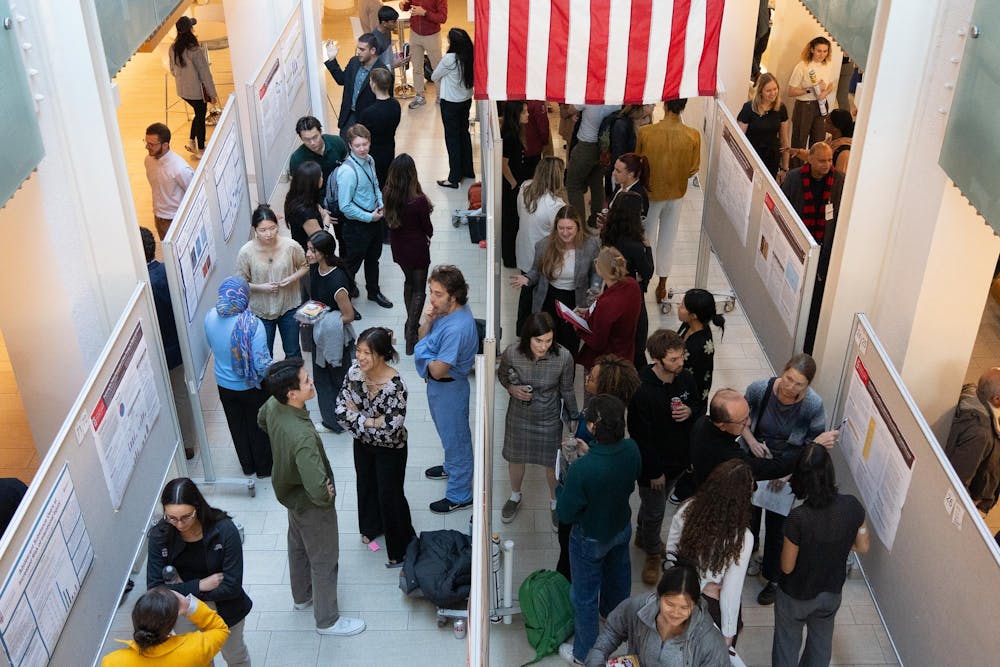The Warren Alpert Medical School held its 18th annual Academic Symposium Wednesday afternoon. The symposium was the largest in the event’s history with over 140 student research posters presented.
The event opened up with a keynote address and brief presentations from three student projects, followed by a poster-viewing gallery walk where students presented their research to visitors and fellow classmates.
“One of the main goals of the symposium is really to prepare students for a lifetime in a career as physicians and researchers,” said Stephanie Chow Garbern, the director of medical student research at Warren Alpert and a first-time organizer of the symposium this year. “Conferences are a major part of how physicians network, share information, start collaborations, learn from their peers,” Garbern added. “It’s a great time to be able to contribute and show how much students contribute to the amazing research we have at Brown.”
Garbern was responsible for selecting keynote speaker Nina Ayala ’10 MD’14 ScM’23, an assistant professor at Warren Alpert. Ayala spoke about her career journey in becoming a clinician-researcher in maternal-fetal medicine, touching on her passion for research into how cognitive responses that increase resilience and optimism can be leveraged to improve postpartum outcomes.
Ayala advised students on the benefits of pursuing a career in research, noting that having specialized research interests is how “we move science forward.” She also emphasized the importance of keeping an open mind for those who may not be sure if research is right for them.
Her address was followed by three student oral presentations.
Dylan Bush MD’27 researched the impact of geographic distance from surgical centers for diabetic patients in the Solomon Islands, a country with one of the highest adult diabetic rates that faces chronic insufficiencies in its medical workforce. Bush found that nearly 80% of patients with diabetic foot disease waited longer than seven days from the onset of their symptoms before seeking care, and he has since worked with the local World Health Organization office to make a national diabetic foot disease plan.
Alison Meyers MD’27 studied the differences between pregnancies that involve natural implantation of embryos compared to programmatic implantation during a suppressed menstrual cycle. She found that pregnancies with programmatic implantation had a lower risk of producing two or more fetuses, which can help reduce potential pregnancy complications.
Other student research focused on the growing field of medical humanities, including a presentation by Claire Lin ’23 MD’27, a former Herald illustrator, and Diana Wang MD’27. They shared their work on how non-pharmacological methods, like receptive music-based interventions can improve patients’ overall well-being during cancer treatment sessions. They found that these music-based interventions led to a significant increase in well-being and significant decreases in pain, tiredness, nausea, anxiety and shortness of breath.
In her undergraduate years, Wang’s thesis centered on “music therapy for depression patients,” which inspired her to study the neural paths “that help us gain the potential to use music and intervention studies.”
The majority of the students who presented their posters are second-year medical students who conducted their research over the summer. Some are involved in the Scholarly Concentrations Program, which is a longitudinal program that provides faculty mentorship for students interested in pursuing a particular field of interest more deeply, Garbern said.
Fourth-year medical students also presented their work through the Primary Care Population Medicine program, which awards students both a Doctor of Medicine and Master of Science degree.
One student in the Scholarly Concentrations program, Joshua Woo ’23 MD’27, evaluated the success of custom large language models in retrieving suggested treatment plans that physicians can use to treat ACL injuries.
While baseline models only perform at an accuracy level of 50% to 60%, Woo’s model boasted an accuracy of up to 90%, highlighting the potential of generative AI in healthcare, he said.
Despite spending the day presenting their findings, student researchers said they were still able to appreciate the bigger picture of what the symposium had to offer.
“This symposium has been really great because you get to see such a variety of different types of research,” Woo said. “You’re really getting to see a variety across different methodologies, across different topics, across different students and across different goals and mentors.”
Jonathan Kim is a senior staff writer covering Science and Research. He is a first-year student from Culver City, California planning to study Public Health or Health and Human Biology. In his free time, you can find him going for a run, working on the NYT crossword or following the Dodgers.





